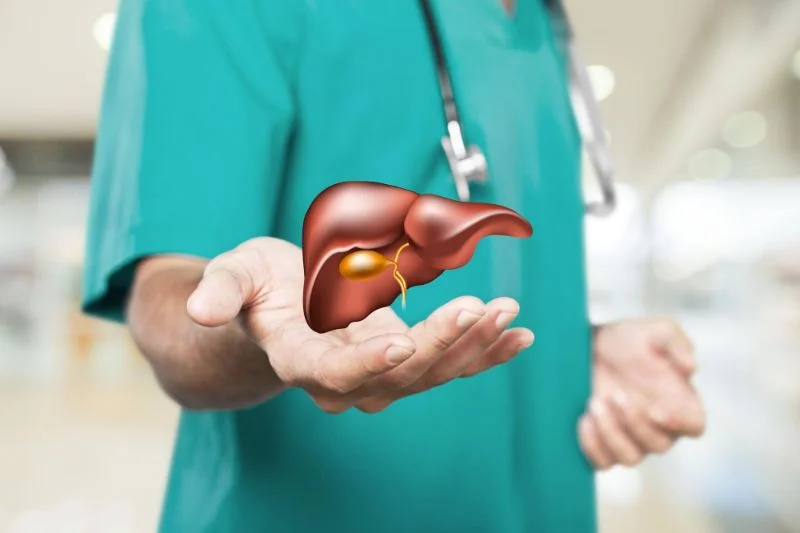Liver enzymes are protein structures that play a vital role in various chemical reactions within the liver, which are responsible for detoxification, protein synthesis, and the production of digestive enzymes. Elevated liver enzyme levels can indicate liver inflammation or damage, adversely affecting health. Understanding the causes, symptoms, and diagnostic tests for high liver enzymes is crucial for proper diagnosis and treatment.
The liver enzymes also have a significant role in metabolism, regulating red blood cells (RBCs) and glucose synthesis and storage. They also control the levels of chemicals in the blood, and help excretes waste products. Another function of liver enzymes is to produce bile and substances that help your blood clot, break down food and toxins, and fight infection. Thus, a high liver enzyme level can harm one's health.
These liver enzymes are alkaline phosphatase (ALP), alanine transaminase (ALT), aspartate transaminase (AST), and gamma-glutamyl transferase (GGT). If your liver is inflamed or damaged, it releases liver enzymes into your bloodstream (usually ALT or AST). This causes an increase in liver enzymes in the blood.
Causes of High Liver Enzymes
An increase in liver enzymes can be attributed to liver inflammation and damage, which have many causes. The most commonly diagnosed reason for high liver enzymes is fatty liver disease (FLD). FLD is a common condition caused by storing extra fat in the liver. Research suggests that nearly half of individuals with high liver enzyme levels have fatty liver disease.
Other causes for a high level of liver enzymes can include:
Can Stress Cause Elevated Liver Enzymes?
Stress and anxiety have been found to contribute to high liver enzyme levels since they reduce blood flow to the liver. Stress is also connected to elevated cortisol levels, which, in turn, is connected to liver damage. Additionally, NKT (Natural Killer Cells) expand in the liver during periods of stress and kill liver cells, worsening liver conditions.
Other connections between liver disease and stress are:
- People with hepatitis C often comment that a period of stress usually leads to a 'flare-up' of symptoms, especially fatigue.
- In patients with the persistent condition of Hepatitis B, there is a relationship between depression and ALT (alanine aminotransferase) levels that indicate whether you have liver disease or injury.
- Liver transplant patients suffering from depression, anxiety, and stress-triggered mood swings are more likely to reject the transplanted liver.
While stress alone does not directly cause elevated liver enzymes, managing stress is important for overall well-being and liver health.
How To Know If You Have High Liver Enzymes
Most people with elevated liver enzymes are usually asymptomatic, but underlying conditions responsible for the high levels of liver enzymes may manifest specific signs. Liver damage and related diseases that may be a probable cause show symptoms such as:
Tests For Elevated Liver Enzymes
If you have symptoms of conditions that typically cause liver damage, your doctor will usually order a test for high liver enzymes.
Routine blood tests are normally used to assess liver health and detect a high level of liver enzymes in the blood. These tests measure the levels of AST and ALT enzymes, which are released into the bloodstream when the liver is inflamed or damaged. Different ratios of AST to ALT can indicate various underlying causes. If you have high levels of AST or ALT, your doctor will conduct further diagnostic testing to determine the underlying condition.
Your healthcare provider may perform a liver function test (LFT) or liver panel to screen for this specific concern to check your liver enzyme levels. A liver function test is a series of tests that evaluate the levels of certain enzymes and other proteins in your blood. Regular liver function tests may be recommended for individuals at risk or those showing symptoms of liver damage.
Treatment Options
Most patients with a high level of liver enzymes usually return to normal after 2 to 4 weeks following the doctor's recommended treatment plan. However, if this is not the case, your doctor may order more blood tests or imaging tests and refer you to a hepatologist specializing in liver diseases.
The treatment for elevated liver enzymes will focus on managing the underlying condition causing the increased levels. Since the underlying cause of liver damage is usually responsive to treatment.
Treatments for the common causes may include:
- Weight loss
- Reduction in alcohol consumption
- Eating a healthful, balanced diet
- Managing blood sugar and stress levels
- Increasing intake of fluids
- Antiviral medication in cases of hepatitis
Cirrhosis, however, is not a curable condition. However, treatments such as a modified diet, weight loss, and reduced alcohol consumption can help slow the disease's progression and reduce the risk of further liver damage. The prompt diagnosis and treatment of conditions that affect the liver can help prevent cirrhosis and improve outcomes.
Conclusion
If you have elevated liver enzymes or abnormal liver function test results, it is important to consult with your doctor to determine the underlying cause. Various treatment options are available for conditions contributing to high liver enzyme levels. In addition, making certain lifestyle changes can help lower these levels. Cura4U offers convenient access to liver function tests, including liver enzyme testing, through Quest Diagnostics and Bio-Reference. With the added benefit of home sampling, you can conveniently get tested for liver enzymes at an affordable price. Feel free to contact a Cura4U Physician to guide you on whether you should consider checking your liver enzyme levels.
Our clinical experts continually monitor the health and medical content posted on CURA4U, and we update our blogs and articles when new information becomes available. Last reviewed by Dr.Saad Zia on June 7th, 2023.
References
Fatty Liver Disease - https://www.mayoclinic.org/diseases-conditions/nonalcoholic-fatty-liver-disease/diagnosis-treatment/drc-20354573
Liver Function Test - https://www.webmd.com/hepatitis/liver-function-test-lft
Liver Function Tests - StatPearls - NCBI Bookshelf (nih.gov)- https://www.ncbi.nlm.nih.gov/books/NBK482489/
Abnormal liver enzymes: A review for clinicians - PMC (nih.gov)- https://www.ncbi.nlm.nih.gov/pmc/articles/PMC8637680/
Elevated Liver Enzymes in Asymptomatic Patients – What Should I Do? - PMC (nih.gov)- https://www.ncbi.nlm.nih.gov/pmc/articles/PMC5719197/












